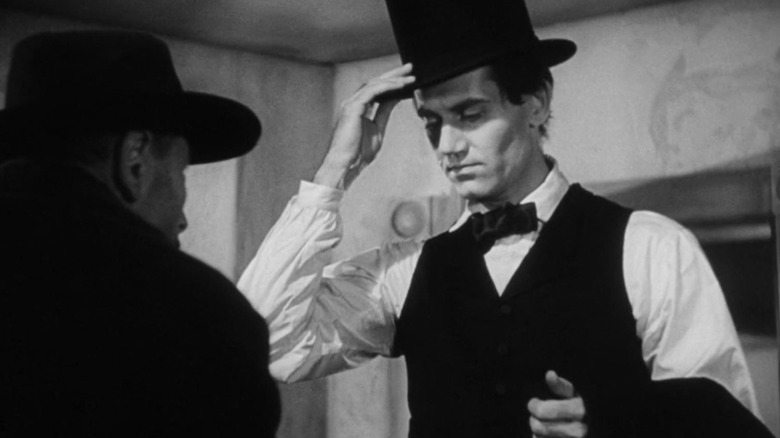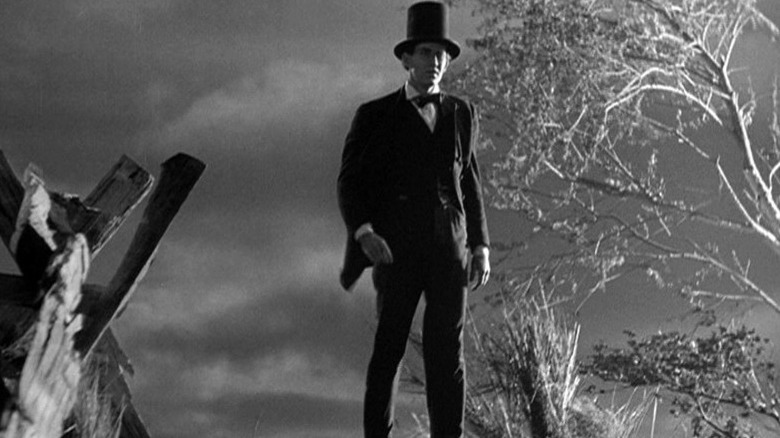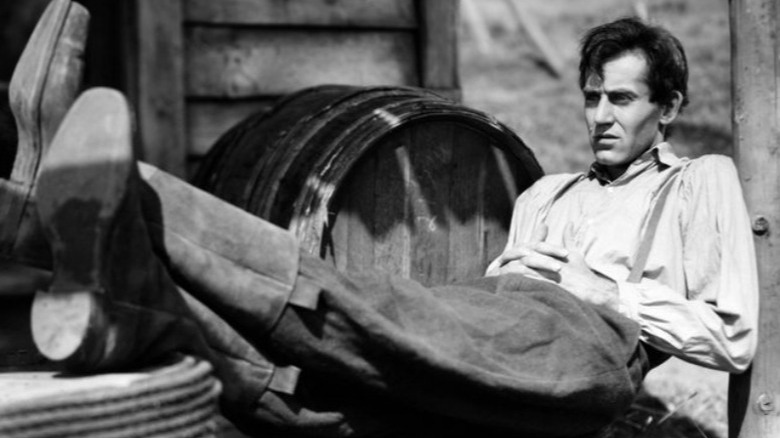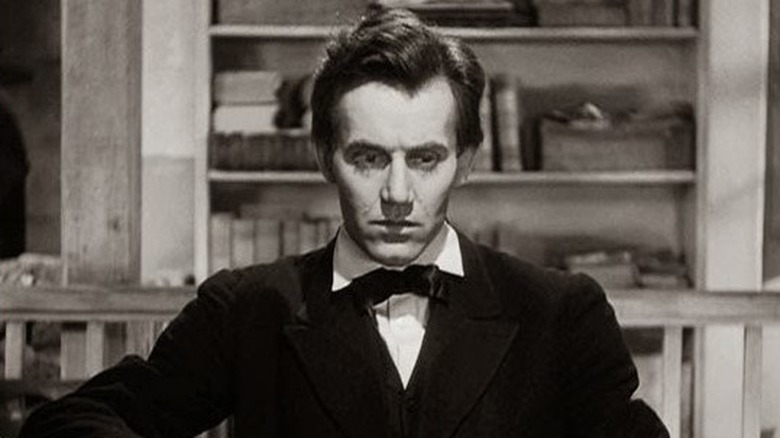John Ford Had To Force Henry Fonda To Say 'Yes' To Young Mr. Lincoln
Abraham Lincoln, for whatever his historical faults, is perhaps the most cinematic President the Unites States has ever had. Whether you put him in a theatrical D.C. backroom drama like Steven Spielberg's "Lincoln," or in a silly, pulpy movie like Timur Bekmambetov's "Abraham Lincoln: Vampire Hunter" (from the same year!), you get a great film. Maybe it's because of his iconic appearance, maybe it's due to the almost mythical challenges of leading a country in the midst of a Civil War, or maybe it stems from the temptation to cast him as a hero battling the evils of U.S. slavery.
Spielberg's "Lincoln" has scenes set in the wreckage of battlegrounds. "Vampire Hunter" has Honest Abe fighting vampires on runaway trains. Most every film about Lincoln dramatizes the Civil War to some degree, and they typically allude to Ford's Theatre, where he was assassinated. That's what makes a movie like John Ford's 1939 film "Young Mr. Lincoln" so special — the emphasis is very much on the "young" part of the title, of the trials and difficulties that would give the future president a sense of diplomacy and decorum. It's a historical film, much more in the vein of a biopic than Spielberg's film.
"Young Mr. Lincoln" is led by a magnificent Henry Fonda performance, one where the actor gets to be charming and amused, delivering Lincoln's homespun, folksy wisdom in an almost musical cadence. The tall and lanky Fonda was a perfect fit for Ford's conception of Lincoln. When you watch the movie, he looks comfortable, giving a relaxed and naturalistic performance. Despite his seeming comfort with the part, however, Fonda didn't want it at first. And Ford would have to force him to sign on for it.
Ford's love of Lincoln
The poster for "Young Mr. Lincoln" calls it "The story of Abraham Lincoln that has never been told!" It has a point. Few, if any, movies about the president focused on his time as a lawyer in Springfield.
John Ford, who by 1939 had become something of a star director at 20th Century Fox for his folksy films with Will Rogers, was a major history buff, with a particular interest in Lincoln and 19th century Americana. That was what led to him sneaking a Ulysses S. Grant short film into an episode of "Wagon Train" that he directed in 1960, with an uncredited John Wayne appearance as another historical figure.
In 1939, the Westerns for which Ford is now best known were still some years out on the horizon ("Stagecoach" aside, of course). But his strongest films up to that point bring the U.S.' past to life with rough hewn charm and his trademark beautiful imagery. Some of those movies, like "The Iron Horse" or "The Prisoner of Shark Island," featured Lincoln in brief scenes that focused on his humanity in difficult scenarios. Those earlier movies never play him as a caricature.
"Young Mr. Lincoln" was the first Ford film to turn the president into the focus of the movie. Still, as much as "Young Mr. Lincoln" is the story of Abraham Lincoln (Henry Fonda) as a young lawyer, it's also a story of a small U.S. city on the rise and of human prejudice. Not too concerned with plot, the movie spends as much time on Lincoln going to a dance or judging pie as it does his legal work.
Ford had a great deal of reverence for Lincoln. So did Fonda. And that was why he couldn't just accept the role.
Fonda's principles
Henry Fonda had a welcome turn of fortune going into the late '30s. Besides playing the lead in a Fritz Lang crime film called "You Only Live Once," he had a starring role as a complex love interest for Bette Davis in the steamy Southern melodrama "Jezebel." For 1938's "Jesse James," he played the outlaw's brother Frank, which also furthered his career.
Throughout his life, Fonda would follow his principles even at expense to his movie star career, whether it involved enlisting early in World War II or working on the stage exclusively for the late '40s and early '50s to avoid getting stuck with another prohibitive film studio contract. He was not a man who prioritized a paycheck or even his Hollywood reputation over doing what he felt was right. He could be self-conscious too, walking out of the first screening of "12 Angry Men" even though he recognized the artistry behind it.
Eventually, Fonda's difficulties would lead to the famously irascible John Ford slugging him on the set of 1955's "Mister Roberts," but in 1939 they were at the beginning stage of their creative relationship. They first met because Ford was attempting to convince the actor to play Lincoln.
According to Tony Thomas' "Complete Films of Henry Fonda," Ford wasn't the first person to approach Fonda for the role of Lincoln. That title fell to the movie's writer Lamar Trotti and its producer Kenneth MacGowan, who had heard of Fonda's love of Lincoln and knew he was the right call. But Fonda himself didn't agree. In many ways, he felt he couldn't measure up to the president he admired. And seeing himself in the Lincoln costume and Lincoln makeup activated his self-consciousness.
Ford's job would be snapping him out of it.
The jake-legged lawyer
Even though Henry Fonda was one great role away from stardom, and even though Abraham Lincoln could be that role, he rejected it. As Tony Thomas' "Complete Films of Henry Fonda" states, Fonda considered Lincoln "sacrosanct," and was on the fence about playing a man he considered a personal hero. How did John Ford make film history by getting Fonda to take the role?
He was angry, to start with. The director who would one day make "The Man Who Shot Liberty Valance" miserable for everyone involved couldn't understand Fonda's trepidation, or at least made a show of not understanding it. It would have been a rare actor who balked at the chance to play one of history's great figures, but here was Fonda, denying it.
In a scene out of "The Fabelmans," Fonda nervously entered Ford's office, "the way a recruit would go in to meet the admiral," according to Joseph McBride's "Searching For John Ford." Ford began to shame him, asking in four-letter words why Fonda didn't want the part. If Fonda's problem was that he couldn't play a man he worshiped, Ford ridiculed him. "You think you'd be playing the Great Emancipator? He's a jake-legged lawyer in Springfield!"
Ford's berating of Fonda worked. The actor signed on to play the role, and, true to Ford's conception, his take on Lincoln is less a Great Man than a funny, mild-mannered 19th century lawyer. When he prevents a lynch mob from taking the life of an accused murderer, he does it not with esteemed dignity but a sweaty bit of charm.
Fonda ended up being a perfect fit, not just for Lincoln but for many of Ford's classic films. If he hadn't agreed to play Lincoln, film history would be wildly different.



